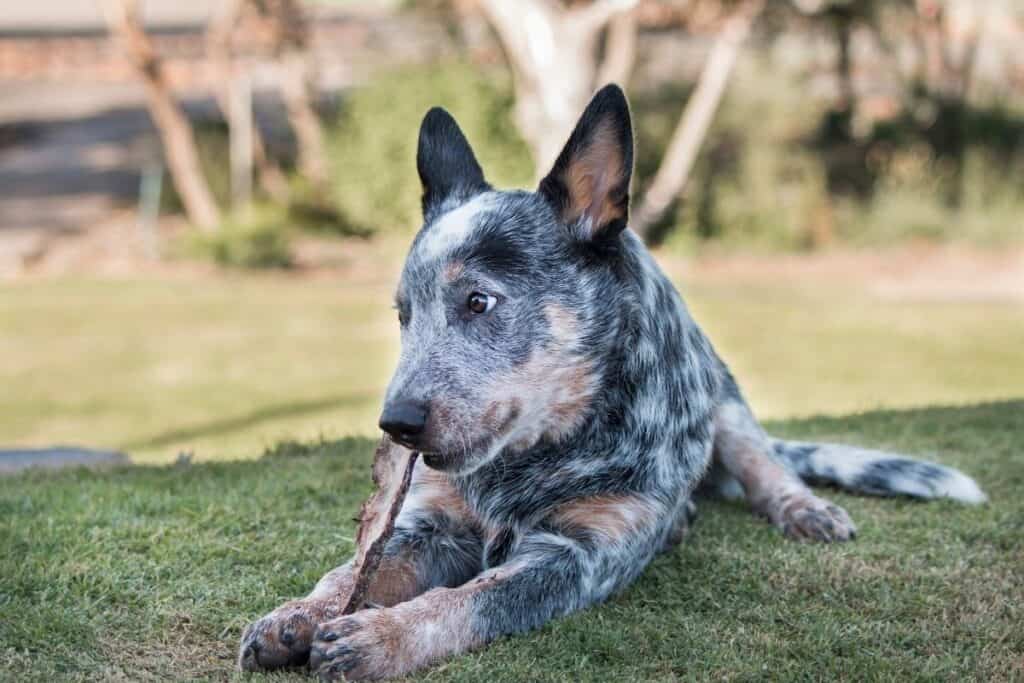Are Blue Heelers Big Chewers?

Blue Heelers are awesome dogs, but have you ever thought about whether or not a Blue Heeler likes to chew things? If so, this article will cover all the details about their chewing habits and how to manage to live with a Blue Heeler.
Are Blue Heelers Big Chewers?
Blue Heelers can be really big chewers that will chew anything in sight if this behavior is not channeled in the right direction. Chewing for any dog breed is linked to their innate nature as a dog, their lifestyle, and how they react.
Many things can be done to help a Blue Heeler that is a big chewer to find contentment during times of stress.
One top choice is providing them with a durable, good-quality chew toy.
This helps the Blue Heeler do what they like as a dog, chew while providing them an outlet for stress.
This also helps protect the pet parent’s belongings and household items from damage.
Despite the annoyance many pet parents might feel when their dogs chew things, it is a normal part of their lives.
Training can help with reducing the chance that the Blue Heeler will chew something off-limits.
While training does help, it is not a cure-all.
Training, a good quality chew toy, and reminders when needed are very important.
It can be tempting when you find your Blue Heeler chewing something important to scold.
This is not necessary.
A firm NO while redirecting their attention to another activity is helpful.
That other activity should include offering them another chewing option as a beloved toy.
They should also be offered praise and reward for following instructions.
The Blue Heeler will be more inclined to chew at certain stages in a dog’s life.
As a puppy during the teething phase, chewing will happen more often.
During these challenging times, patience is also essential for everyone’s happiness.
The Blue Heeler puppy is doing the best they can to deal with bodily changes, like developing teeth.
Chewing becomes a non-issue when training, redirecting, or channeling and some good quality toys are in place.
With patience and these tools being utilized, the Blue Heeler will eventually get the idea and only chew what they are allowed.

So why do dogs like to chew?
Dogs like to chew for a variety of reasons. One is because it gives them something to do. Unlike humans, many dogs don’t have occupations that keep them busy.
Chewing fills their need for something to do when they are bored, but it can also help to provide strength and health to their jaw, teeth, gums, and mouth area.
Both dogs in the wild and every dog breed love to chew for fun and stimulation. If a dog is not provided with something to chew, they will find something, anything.
Chewing also quiets their mind and any anxiety they may be feeling.
They will need to chew if their immediate environment is stressful on any level.
Chewing for a dog is fun and entertaining physically, mentally, and emotionally.
It provides them with physical activity that will quiet thoughts and emotions.
Dogs that are not provided with something acceptable to chew will find other options.
These choices can include a stick, a shoe, or anything else inside and outside.
Each dog will be unique in their choice of chewing toy or item and how often they like to chew.
Blue Heelers can be heavy chewers if they don’t have enough to do.
For dogs like the Blue Heeler that were bred to work, not having physical work can make them bored.
Pet parents can manage this by having jobs for them to do.
That innate nature that makes them want to chew will always be there.
However, jobs and physical activity will reduce the need to entertain it for the wrong reasons.
What are the health benefits of chewing for a Blue Heeler?
The most obvious health benefits of chewing for a Blue Heeler are to their teeth, mouth, and jaw. Chewing promotes strength and cleanliness.
Dogs that don’t have their teeth brushed regularly will benefit the most.
Toys designed for cleaning their teeth promote dental health.
Puppies will also benefit the most during teething as chewing relieves discomfort, pain, and pressure during this time.
Specific teething toys are a great option for this time.
Dogs that chew can handle stress better. With an outlet, like chewing a toy, the Blue Heeler can release their anxiety of stress.
This chewing helps them in situations they cannot control.
For instance, during thunderstorms, or other scary situations, chewing can take their mind off the sounds and flashing.
Aside from that, it may relax them a bit, so they are not as scared the next time.
Chewing provides mental stimulation, which all dogs need in their daily lives.
We often forget that our fur babies need this type of exercise that should always be acknowledged daily.
Toys that are designed explicitly for this purpose provide entertainment and keep their mind sharp throughout their lives.
Mental stimulation helps keep older pups feeling young and potentially living longer.
There are even help benefits for their human family.
Chewing on a toy can provide less stress for their pet parents as the Blue Heeler is less likely to chew something important in the house.
How do I choose the suitable chew toy for my Blue Heeler?
There is no right or wrong toy for a dog. Often it is best to select a few chew toys that are good quality, durable, and designed to entertain and stimulate.
The chew toy should not resemble something in the household, like a stuffed animal.
This can confuse your Blue Heeler as they will not necessarily know the difference between the toy and off-limits item.
Toys should always be durable. Selecting brands or using reliable websites can be helpful.
Choosing toys with high reviews or that seem fun to you will usually work.
The important thing is you don’t always have to get it right. Many households have a few toys that don’t get played with often.
With time the pet parents will learn what type of toys their Blue Heeler likes best.
In the meantime, keep it fun and exciting.
For puppies, there are toys expressly designed for teething that work best.
Chewing is a natural part of a dog’s life. It should be encouraged but channeled for everyone’s happiness.
With a bit of patience, creativity, and understanding, chewing can be a normal part of life.
This is important as it has many benefits for the Blue Heeler.
While it may seem annoying at times, health and wellness are our most important assets, even for your dog!
